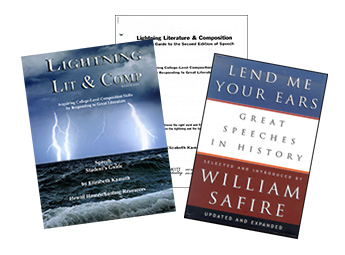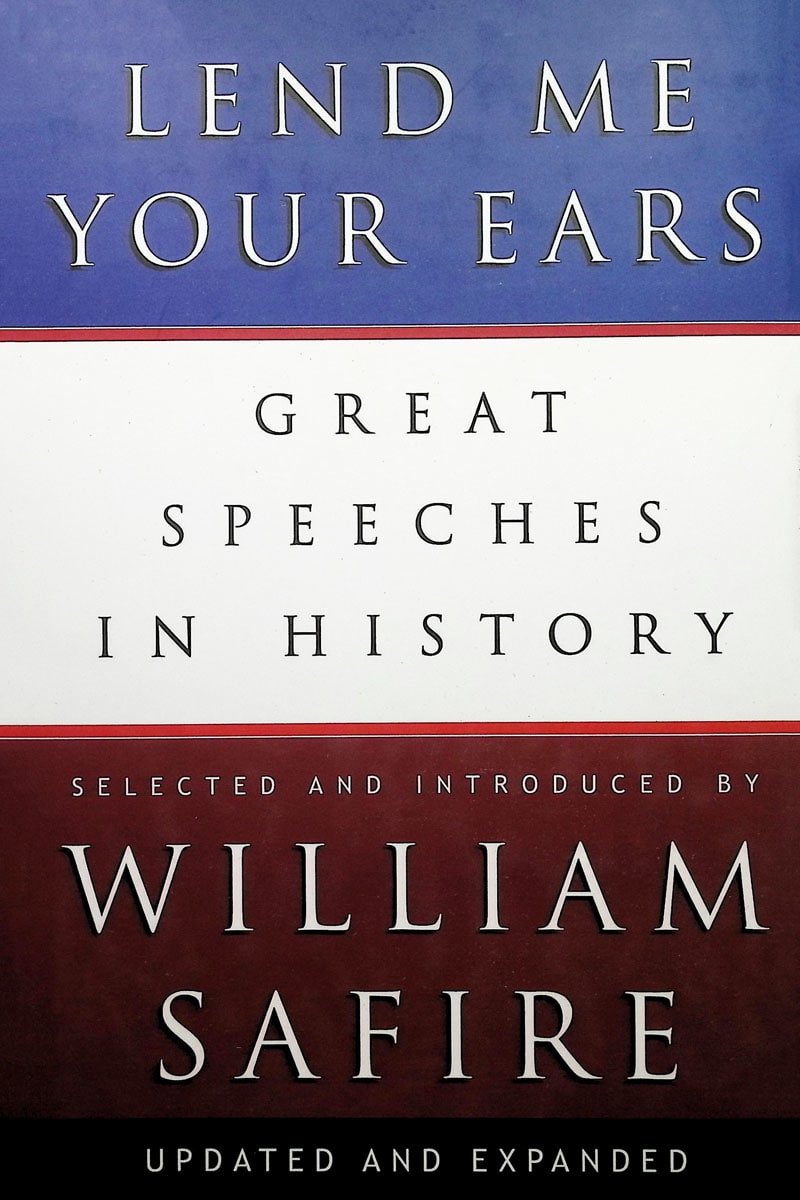Lightning Lit & Comp is an entire series of courses for literature and composition for junior and senior high. Their high school level Speech course is similar to the other courses in that it involves a great deal of reading and composition work, but it is unique from that series in a number of ways so I review it separately here. It is also different from any other speech course I’ve seen. As author Elizabeth Kamath explains, “Speaking tips are included, but the focus here is on reading great speeches and learning to write them” (Speech Student’s Guide, p.1). Even though her goals are for students to be exposed to great speeches and learn how to write excellent speeches of their own, it would be easy enough in most cases to provide opportunities for students to present some of the speeches (or parts of speeches) that they write. It might be worth forming a group for shared presentations.
A 145-page students’ guide is the core of the course. Students will also need the book Lend Me Your Ears: Great Speeches in History by William Safire, and parents or teachers will need the teacher’s guide. You will need to obtain Lend Me Your Ears from another source.
Lend Me Your Ears’ 1100+ pages feature famous and not-so-famous speeches under headings such as Memorials and Patriotic Speeches, Tributes and Eulogies, Debates and Argumentation, Trials, Sermons, Inspirational Speeches, and Speeches of Social Responsibility. Safire introduces each speech with a brief explanation so that students understand the context.
The student’s guide presents the course in eight lessons and three “perspectives” lessons. The lessons help students learn from the best examples as they read between six and sixteen speeches per lesson. The eight lessons focus on Opening, Content, Research and Factual Argument, Organization, Audience, Words and Sentences, Rhetorical Style, and the Conclusion. The three Perspectives lessons deal with the actual presentation under the headings Looking Your Best, Sounding Your Best, and Visual Aids.
The course can be used over a semester or a year; suggested schedules are in both the teacher’s guide and student’s guide. The student’s guide is written directly to students so that they can work independently through all except the discussion questions.
For each lesson, they will read the listed speeches and their introductions from Lend Me Your Ears. The student’s guide has a short list of questions that students should keep in mind as they read the speeches. Next, they answer the comprehension questions, writing out their answers to be checked by a parent or teacher. The “Literary Lesson” follows with instruction on one of the major topics I listed above. Literary Lessons are enlivened by examples from the speeches students have just read. Students next choose one or two writing assignments from the list for that lesson to complete. These papers should be one or two pages in length and contain three to five paragraphs.
Discussion questions are optional, but they take students deeper into moral, ethical, political, social, and spiritual issues that are well worth investigating.
Other optional activities are recommended. Students might keep a vocabulary notebook and/or a reading journal. They might listen to recordings of speeches. The family might be the audience for oral summaries or commentary about speeches the student has just read.
The loose-leaf, three-hole-punched teacher’s guide, which should be put in a binder, serves primarily as an answer key for the comprehension questions. However, it also has an explanation of the course, reproducible grading templates, lists of the writing exercises, and the discussion questions.
The speeches selected for students to read are drawn from all of the different categories in Lend Me Your Ears, so there might be religious or political speeches with which some readers might take issue. Remember that some of these speeches were intended to bring about social, political, or religious changes. The course seems slightly overweighted with speeches from Protestants such as Jonathan Edwards, Martin Luther, John Calvin, and Billy Graham, but there are also speeches from Carl Sagan and the Buddha. The course presents all speeches objectively without pushing any viewpoints or agendas. There is a small representation of speeches from other countries and cultures. Even if you disagree with the content of any of the speeches, the point is to expose students to thoughts and ideas from the past and present, even if they are controversial.
Using great speeches as models from which to learn is a method typically associated with classical education. The discussion questions reflect the Socratic questions used in classical education, and some of the writing exercises might also support that approach. However Kamath didn’t intend for this to be a purely classical approach, and so she adds other elements. The comprehension questions make it easier to hold students accountable for actually reading the various speeches—a helpful assist for busy homeschooling parents and teachers who can’t monitor everything their students accomplish. The Literary Lessons help to focus students' attention on the primary skills they need to develop, and the writing assignments stretch students to think about both the technical aspects of writing and methods of influencing their audience.
Learning from the best practitioners seems a brilliant way to teach the skills of public speaking. In my opinion, Lightning and Lit Speech’s implementation of that approach is both high caliber and practical for many homeschoolers.











